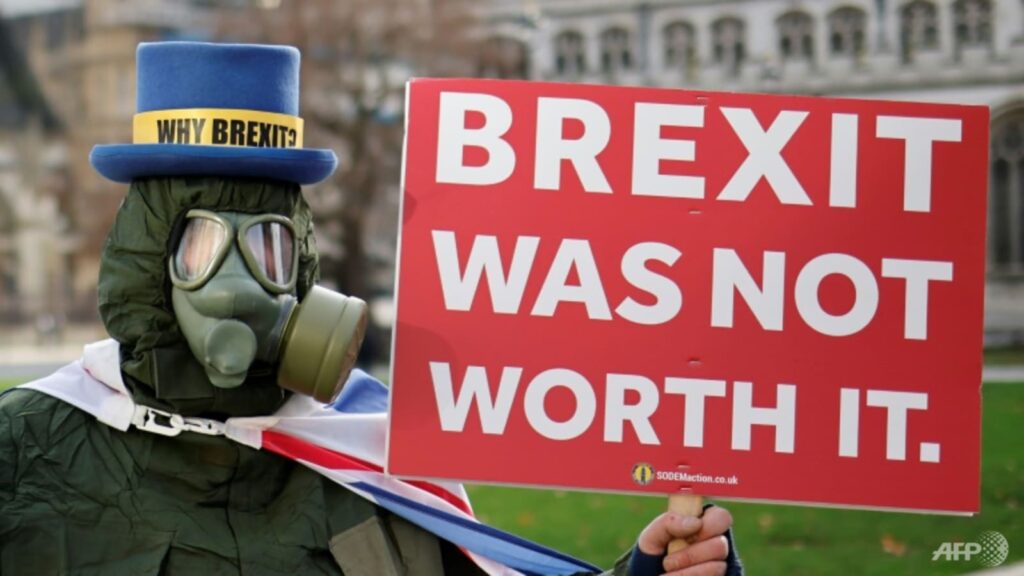PARIS: In the heat of Brexit talks in 2018, a frustrated British official asked European Union negotiator Michel Barnier’s team: “Imagine our country was not there and suddenly surfaced from the seabed and installed itself at your shores. What relationship would you ideally want with us?”
The question, relayed in a new book by Barnier aide Stefaan De Rynck, is being asked again three years after the Union Jack was lowered in Brussels – though this time with a friendlier undertone. The threat of a UK-EU trade war over Northern Ireland is receding amid the real war in Ukraine; there’s even hope of a breakthrough on this politically sensitive issue as early as next week.
Both sides are making an effort: A UK humbled by the chaotic premiership of Liz Truss and the economic costs of Brexit is engaging seriously with an EU shaken by war at its eastern frontier and an energy crunch.
Even more remarkably, some high-profile voices are wondering openly if the UK might return to the EU fold one day. Barnier recently talked of an “open” door, as have some members of the European Parliament and London Mayor Sadiq Khan (though Labour leader Keir Starmer quickly slapped down the latter).
This is all heady stuff. But it’s not helpful for policymakers’ thinking to veer from one extreme to another. Better to think about an incremental “Breconciliation”.
EU AND UK HAVE CHANGED SINCE BREXIT
The EU has changed since Brexit. While the UK’s departure inflicted costs on both sides – the UK took with it a chunk of Europe’s economic and military heft but lost privileged access to workers, markets and trade – Brussels has moved on.
Vacuums left by the UK in Europe’s parliament, commission and council have been filled, as has the budget hole left by the British taxpayer; in fact, the EU budget is bigger than it used to be. Fears of a deregulated UK rivaling the EU on its doorstep have so far proven unfounded.
The continent has not fully replaced UK hard power or the soft power of the City of London, but amid a more integrated European economy and more security cooperation, there’s little pining among diplomats for Britain rejoining – and that goes way beyond France.
Meanwhile, the UK political debate over Brexit has become no healthier. Public opinion is certainly turning against its economic effect.
Boris Johnson in 2018 imagined that escaping the “stockade” of EU regulation would free up at least 4 per cent of gross domestic product; five years on, John Springford of the Centre for European Reform estimates the UK economy is 5.5 per cent smaller than without Brexit, and collects £40 billion (US$48 billion) less in yearly tax revenue.
But the frenzy over a recent meeting between leaders of both Leave and Remain camps suggests emotions and polarisation are still running high. That is no help to the EU.
“The risk Europeans still see is UK domestic politics,” says Jonathan Faull, a former top UK official who spent 38 years in the European Commission who nonetheless sees grounds for rapprochement. “Why rush for new deals that could be disowned yet again in the medium term?”
A THREE-STEP PLAN TO IMPROVE UK-EU TIES
Better ties should instead be seen as a careful multistep process. Step one is getting rid of the most obvious thorn in the relationship: A Northern Ireland breakthrough that would see the UK ditch its trade-war brinkmanship and implement border arrangements it signed up to in 2020. That’s potentially within reach.
Last month’s agreement on data sharing was a big step, providing the EU with live information tracking goods from Great Britain to Northern Ireland. Border posts will be built. That has helped create the trust needed for Brussels to accept reductions on customs checks. The big unknown is whether UK opposition to the role of the European Court of Justice in resolving disputes can be overcome.
Step two would involve detoxifying the politics of such a breakthrough: Selling the deal to hardline Brexiteers in Westminster and the pro-UK lawmakers in Northern Ireland.
It would mean sacrificing Johnson’s “cakeist” philosophy – that the UK can pick and choose what it wants from the EU in terms of rules and market access. Even Labour has been guilty of imagining special treatment for UK access to the EU single market.
Then comes the third step: Cooperation on areas of mutual benefit. Research and innovation, renewable energy in the North Sea, satellite observation and the use of Galileo navigation data are examples cited by De Rynck.
That might create a better relationship where the UK can secure “Brexit benefits” not against the EU but in partnership with a continent that has its own elusive goals of “strategic autonomy”. The EU’s market size, influential rule-setting and Green Deal ambitions could make it a good partner for a UK with intelligence and military resources, regulatory expertise and research institutions.
This is a long way from “Rejoin”. But it’s also a long way from the current, less-than-ideal situation. Give the EU (and UK) a break from extreme future visions, and focus instead on the three steps it will take to improve ties instead.
